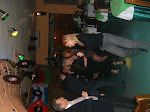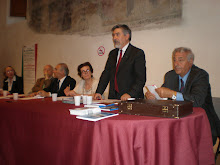Series of commentaries, policy briefs and working papers published in the context of the IAI-Istanbul Policy Center-Mercator Foundation project "Turkey, Europe and the World" on the political, economic and foreign policy dimensions of Turkey's evolving relationship with the EU.
• The Future of Europe, Differentiated Integration and Turkey’s Role, by M.Müftüler-Baç
 What impact would Turkish EU membership have on the future of the EU, which is now hotly debated in crisis-ridden European countries? Turkish membership could be a blessing in disguise. The evolution of the EU towards a path of differentiated integration, with a new type of membership for Turkey, could provide the Union with further opportunities to deepen integration in different policy areas. Turkey might adopt the EU’s acquis on key polic ies such as energy, transport, the single market or common security and defence, but remain outside of the EU framework as far as parts of EU social agenda and the Schengen regime are concerned. If Turkey becomes one of the first examples of such a scheme, the future of European integration could drastically change, as the EU would become a blend of an organizational core and a system of functionally differentiated units. What impact would Turkish EU membership have on the future of the EU, which is now hotly debated in crisis-ridden European countries? Turkish membership could be a blessing in disguise. The evolution of the EU towards a path of differentiated integration, with a new type of membership for Turkey, could provide the Union with further opportunities to deepen integration in different policy areas. Turkey might adopt the EU’s acquis on key polic ies such as energy, transport, the single market or common security and defence, but remain outside of the EU framework as far as parts of EU social agenda and the Schengen regime are concerned. If Turkey becomes one of the first examples of such a scheme, the future of European integration could drastically change, as the EU would become a blend of an organizational core and a system of functionally differentiated units.
• Turkey, Europe and the Syrian Crisis: What Went Wrong?, by N.Tocci
 Syria should have united, not torn, Turkey and Europe apart. It should have led both sides to work together, and through closer foreign policy coordination, possibly rebuild part of that long-lost trust that is badly needed to re-launch the broader EU-Turkey agenda. But when on 21 August 2013 a chemical bombardment, allegedly carried out by government forces, killed hundreds on the outskirts of Damascus, the debate polarized. Turkey was quick to jump on the interventionist band wagon. The EU took a different line. With the sole exception of France, no member state openly backed the idea of a military attack without a UN Security Council resolution. In view of the current prospects for a reinvigorated diplomatic process, what should Europe, Turkey and the US do? Syria should have united, not torn, Turkey and Europe apart. It should have led both sides to work together, and through closer foreign policy coordination, possibly rebuild part of that long-lost trust that is badly needed to re-launch the broader EU-Turkey agenda. But when on 21 August 2013 a chemical bombardment, allegedly carried out by government forces, killed hundreds on the outskirts of Damascus, the debate polarized. Turkey was quick to jump on the interventionist band wagon. The EU took a different line. With the sole exception of France, no member state openly backed the idea of a military attack without a UN Security Council resolution. In view of the current prospects for a reinvigorated diplomatic process, what should Europe, Turkey and the US do? | ||
For further information visit our website
|
Uniformologia: scienza ausiliare della Storia.
-
Uniformi dell'esercito dell'Austria Ungheria 1888, Unità logistiche. Il
tema della uniformologia è trattato sil blogwww.uniformologia.blogspot.com
che...
2 settimane fa























































































Nessun commento:
Posta un commento